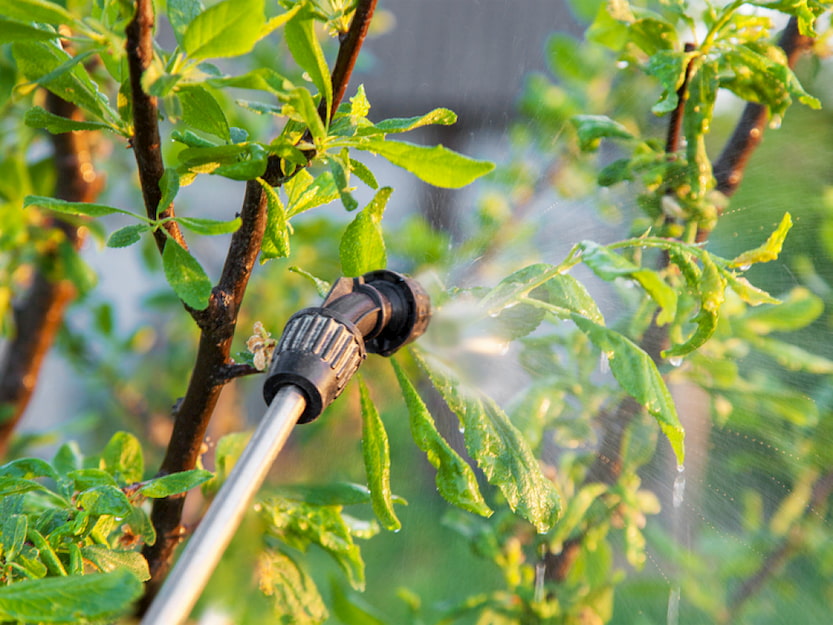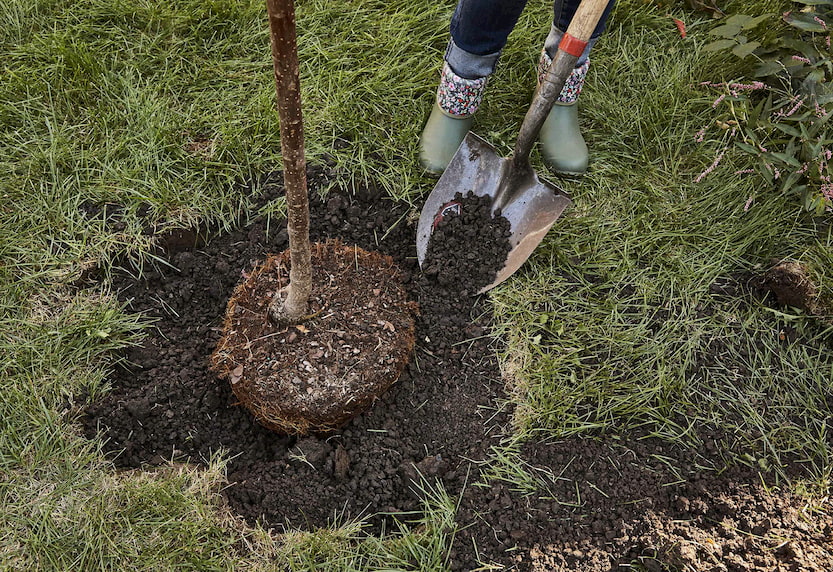Trees and shrubs insect control is an important part of keeping your landscape healthy and beautiful. Harmful pests not only create visible damage to your trees but can cause stress to their health, increasing the chance of a substantial decline and in some cases death of the plant. Getting an early start on dealing with insect and disease issue can make all the difference between a healthy landscape and one that is plagued by problems all season. Furthermore, by focusing on prevention, rather than reacting to disease and insect infestation when it happens, you save money that may be spent on unnecessary pesticides to get to enjoy a more attractive environment.
There are various ways to prevent insect infestation, including proper monitoring, plant care, and treatment. If you don't have time for all these, you can count on specialized services that perform insect control for trees and shrubs. Tree insects control companies use lots of tools to fight these diseases. These include regular monitoring for pest population for fast action, the use of proper plant care practice, planting pest-resistant varieties, and treating contamination when necessary. Keeping pest populations down or eliminated is the goal of insect control for trees and shrubs companies as this leads to fewer problems in the yard or garden. Here are some of the steps they take and that you too can perform.
There are various ways to prevent insect infestation, including proper monitoring, plant care, and treatment. If you don't have time for all these, you can count on specialized services that perform insect control for trees and shrubs. Tree insects control companies use lots of tools to fight these diseases. These include regular monitoring for pest population for fast action, the use of proper plant care practice, planting pest-resistant varieties, and treating contamination when necessary. Keeping pest populations down or eliminated is the goal of insect control for trees and shrubs companies as this leads to fewer problems in the yard or garden. Here are some of the steps they take and that you too can perform.
Monitor Your Garden Regularly
Regular monitoring of trees and shrubs allows for early detection when pest populations are low and easy to eradicate, and this is key in stopping them before their numbers get out of control. For example, the best time monitoring mountain pine beetle is in winter. Check for 'pitch tubes' on the trunks of the trees. If you see pitch tubes, cut a piece of bark off and see if the wood under is bark or discoloured blush-grey. If so, the tree should be removed. Checking your pine trees in winter and treating infested trees will prevent the beetles to spread and damage other trees. It's all a matter of well-timing monitoring and action.
Perform Good Plant Care Practices
Performing good plant care practices can also help you keep pests and diseases at bay. By simply keeping plants and beds clean and well-tended for example, can help you control numerous insect pests. Rotating annual crops from one part of the garden to another from year to year is another great way to reduce problems associated with certain pests. Removing old leaf litter from the base of the trees can prevent other problematic insects. Time planting not only helps avoid windows of emergence for specific pests but also minimize and even eliminate damage. Water plants well throughout the year and if necessary apply organic matter regularly. Apply a thick layer of organic mulch to suppress weeds and retain moisture. And provide extra care to tree and shrubs recently planted or that has suffered damage.
Regular monitoring of trees and shrubs allows for early detection when pest populations are low and easy to eradicate, and this is key in stopping them before their numbers get out of control. For example, the best time monitoring mountain pine beetle is in winter. Check for 'pitch tubes' on the trunks of the trees. If you see pitch tubes, cut a piece of bark off and see if the wood under is bark or discoloured blush-grey. If so, the tree should be removed. Checking your pine trees in winter and treating infested trees will prevent the beetles to spread and damage other trees. It's all a matter of well-timing monitoring and action.
Perform Good Plant Care Practices
Performing good plant care practices can also help you keep pests and diseases at bay. By simply keeping plants and beds clean and well-tended for example, can help you control numerous insect pests. Rotating annual crops from one part of the garden to another from year to year is another great way to reduce problems associated with certain pests. Removing old leaf litter from the base of the trees can prevent other problematic insects. Time planting not only helps avoid windows of emergence for specific pests but also minimize and even eliminate damage. Water plants well throughout the year and if necessary apply organic matter regularly. Apply a thick layer of organic mulch to suppress weeds and retain moisture. And provide extra care to tree and shrubs recently planted or that has suffered damage.
Plant Properly
Plant the right plant in the right place. Each plant has a preference for soil type, moisture, temperature, sunlight, space and more. Planting the wrong plant in the wrong place or condition will stress the plant to the point that it becomes a target for insect pests and diseases. Consider planting pest-resistant varieties. If you have a plant in your garden that is prone to specific pest problems, planting a variety that is generally more vigorous and robust around can help with pest resistance. When pests become prevalent, they can wipe out entire areas of trees. Having different kinds of trees on your garden not only ensure that you'll have something left in one of those pets attacks but also improve the overall look and health of your landscape.
Treat When Necessary
Before applying insecticides, check if there are already 'biological controls' in place. The most popular biological controls are beneficial insects. These are garden-friendly insects, such as ladybugs, lacewings, playing mantids, and parasitic wasps, which consume insect pests in huge number. Give time for the beneficial insect to do their jobs. If things get out of balance and more drastic measures are required, give the professionals a call. They will inspect your property to diagnose the problem and recommend the most effective and least toxic treatment options.
Pest control companies can often eliminate most types of pests, including rodents, spiders, and all sorts of insects - bees, ants, cockroaches, fleas, termites and wasps. Different types of baits and chemicals are necessary to extract and eliminate different types of pests. A licensed pest control technician has the skills and experience to identify the types of pests present on your property and determine how best to eliminate them. The companies can eradicate certain pests by using poisoned bait, which can lead to a trap or various chemicals.
Furthermore, the professionals can provide quicker and more effective results than when you try to fix the infestation yourself. That is because of their experience and chemicals that may not be available to regular consumers. Companies can often complete pest control treatments within one to six hours, with more complex problems taking up to a week to be addressed.
Plant the right plant in the right place. Each plant has a preference for soil type, moisture, temperature, sunlight, space and more. Planting the wrong plant in the wrong place or condition will stress the plant to the point that it becomes a target for insect pests and diseases. Consider planting pest-resistant varieties. If you have a plant in your garden that is prone to specific pest problems, planting a variety that is generally more vigorous and robust around can help with pest resistance. When pests become prevalent, they can wipe out entire areas of trees. Having different kinds of trees on your garden not only ensure that you'll have something left in one of those pets attacks but also improve the overall look and health of your landscape.
Treat When Necessary
Before applying insecticides, check if there are already 'biological controls' in place. The most popular biological controls are beneficial insects. These are garden-friendly insects, such as ladybugs, lacewings, playing mantids, and parasitic wasps, which consume insect pests in huge number. Give time for the beneficial insect to do their jobs. If things get out of balance and more drastic measures are required, give the professionals a call. They will inspect your property to diagnose the problem and recommend the most effective and least toxic treatment options.
Pest control companies can often eliminate most types of pests, including rodents, spiders, and all sorts of insects - bees, ants, cockroaches, fleas, termites and wasps. Different types of baits and chemicals are necessary to extract and eliminate different types of pests. A licensed pest control technician has the skills and experience to identify the types of pests present on your property and determine how best to eliminate them. The companies can eradicate certain pests by using poisoned bait, which can lead to a trap or various chemicals.
Furthermore, the professionals can provide quicker and more effective results than when you try to fix the infestation yourself. That is because of their experience and chemicals that may not be available to regular consumers. Companies can often complete pest control treatments within one to six hours, with more complex problems taking up to a week to be addressed.


